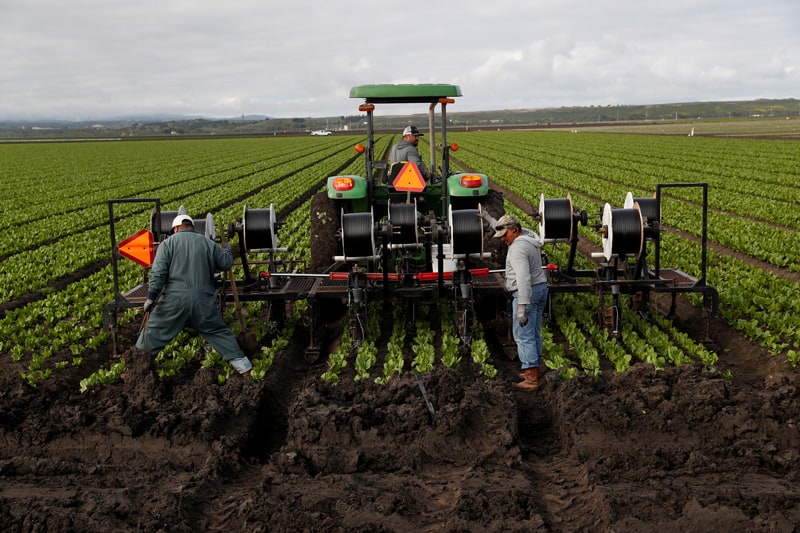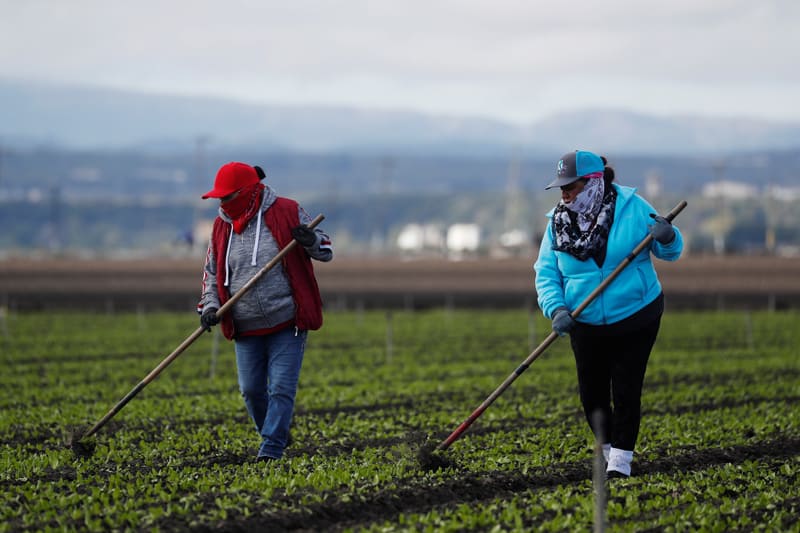WEB-ONLY:
Farm labor advocates warn of pandemic’s wrath
on the essential workers who harvest our food
WASHINGTON (CNS) — As those working from home escalated their complaints or jokes on Twitter about Zoom meetings, the United Farm Workers of America offers a reality check in the form of tweet: “You can’t pick strawberries remotely.”
“The people who put food on our table do not get to telecommute,” the labor organization said in a mid-March statement calling attention to the plight of the country’s more than 2 million farmworkers.
There may be toilet paper shortages in U.S. supermarkets, but the country’s supply of fruit and vegetables and other staples such as meats and dairy produced by the labor of farmworkers — many of them migrants — remains steady thanks to those essential workers. Yet many of them toil without basic protections, their supporters say.

Agricultural workers labor in a Marina, Calif., field March 30, 2020, amid the coronavirus pandemic. (CNS photo/Shannon Stapleton, Reuters)
Even while facing lack of access to adequate health care or wages and immigration woes stemming from the H-2A visa program that allows some of them to work legally in the U.S., the largely unseen workers have kept, until now, the country’s food supply moving.
“The irony is that (now) they’re saying they are essential. They’ve always been essential,” said Carlos Marentes, founder and director of the Border Agricultural Workers Center in El Paso, Texas, in an April 14 interview with Catholic News Service.
They’re considered so essential that on April 15, the U.S. Department of Homeland Security announced a temporary easing of immigration regulations to allow businesses to employ them faster and for longer periods of time than before — an unusual move for an administration that has sought to curtail immigration.
In a statement, the U.S. Department of Agriculture said the temporary changes would help U.S. farmers who employ foreign farmworkers “avoid disruptions” in employment and “protect the nation’s food supply chain.”
No matter how important they are to the nation, however, there’s always been a “historical abandonment” of farmworkers, Marentes said, and this is a time to go beyond “sentimental blackmail” — offering praise for what farmworkers do, without also calling for protection for their rights.
Even though they’re considered essential workers, a looming threat some farmworkers are facing are efforts to lower their salaries at this critical time. Last year, the Trump administration proposed changes in how wages are calculated for those who use the H-2A visa program, essentially lowering their pay.
The H-2A program is a guest worker program, which allows agricultural employers to bring workers from other countries — primarily Mexico — to the U.S. to work on their farms, said Ashley Feasley, director of policy for Migration and Refugee Services at the U.S. Conference of Catholic Bishops.
“The workers who produce our food are essential workers (roughly 2.5 million agricultural laborers total), and they have been declared so. Yet there are announcements from the White House about reducing the wages of guest workers,” she said in an April 14 email to CNS. “This is unjust to further exploit a population that is working to put food on people’s tables at this time.”
And many of them are scared, said Marentes.
As cities around the country — and the businesses that propelled them — began closing down abruptly in mid-March, farmworkers were told to continue toiling because they were important to keep the country moving. But because of stricter measures taken at border towns such as El Paso, Texas, those who worked in the U.S. but lived in Mexico could no longer cross at entry points as they had before to be with their families after their work shifts were over, Marentes said.
Organizations that work with the farmworker population, such as the Border Agricultural Worker Center, began mobilizing, writing letters for the farmworkers so they could carry documents with them saying who they were, where they worked, in case immigration or other authorities scrutinized them on their way to work, Marentes said. Community groups, like Marentes’ organization, also scrambled to secure some form of shelter and a place for them to bathe, find face masks and gloves, and give them a quick lesson on how to keep safe in the middle of a pandemic.
“This is a complex situation,” said Marentes. “There’s a lot of fear.”

Migrant workers clean fields near Salinas, Calif., March 30, 2020, amid the coronavirus pandemic. (CNS photo/Shannon Stapleton, Reuters)
Farmworkers in many cases are up and about at early hours, depending on the harvest; they work in close quarters with others; and some of the places where they work are in remote locations with no doctors or clinics available to them, Marentes said. Many workers also don’t have health insurance and little money to respond to a medical crisis, he said.
Some like Marentes said that if federal or local inspectors weren’t around before to make sure of adequate living and working conditions for the farmworkers, it’s even less likely to happen now.
Others like Feasley shared concerns about the workers’ working and living environment — particularly urgent in the midst of a pandemic. Even before the pandemic, U.S. bishops had long voiced concerns about farmworkers’ working conditions and wage security, and advocated for family unity and “job portability,” which is the ability to apply at different workplaces instead of being locked into one job, as the H-2A visa required.
The bishops’ conference also had noted that “some H-2A workers arrive at their workplaces in debt, having paid significant recruitment fees and/or travel costs for the opportunity to work in the U.S. There has long been concern about labor recruitment fraud, which we (USCCB) have fought to address in our programs and in our advocacy,” Feasley said.
But the pandemic has made those concerns more urgent.
“What is really concerning is, in the context of COVID-19, that the necessary health precautions are not being taken to the extent necessary and in some cases may not be happening at all. Things like social distancing and hand-washing,” said Feasley. “These are often difficult due to cramped housing and the transport to the fields and makes the workers very vulnerable.”
Instances such as the April 12 closing of the Smithfield Foods pork processing plant in South Dakota, which shut down after more than 640 workers tested positive for coronavirus — the largest single-source cluster in the country — have raised alarm about the wrath the pandemic can unleash on the U.S. farmworker population as well as the food supply.
Another major worry for those like Marentes, who advocates for farmworkers, is what employers will do, what protections or care farmworkers will receive, if any, should they contract the virus on U.S. soil.
“I worry about stigmatization,” he said, adding that contraction of the virus could be used later to scapegoat immigrants in general, even though the opposite might be true. Without care after contracting the virus in the U.S., they could return to Mexico and infect their families and friends on the other side, weakening the already fragile health care system of their communities, he said.
Some have asked him: “Carlos, is it even worth it?”
Marcela Celorio, consul general of Mexico in Los Angeles, wrote in an April 14 op-ed in the Los Angeles Times, that even though farmworkers, “documented and undocumented,” are of “strategic importance,” they remain “among the least protected against the coronavirus pandemic.”
Though there are no current figures on how many farmworkers could already be infected, Celorio urged a quick remedy to their crowded working and living conditions, as well as priority testing for COVID-19, providing quarantine for those who have been exposed, medical care for those who test positive, while allowing those who test negative to continue working using social distancing measures.
“This situation puts the health of farmworkers at great risk and with it the food supply in North America,” she warned. “We owe the women and men who labor in the fields a huge debt, especially in these dangerous times. Protecting their health and well-being should be an urgent matter for all of us.”
Featured image: Migrant worker Cesar Lopez, 33, cleans the fields near Salinas, Calif., March 30, 2020, amid the coronavirus pandemic. (CNS photo/Shannon Stapleton, Reuters)

